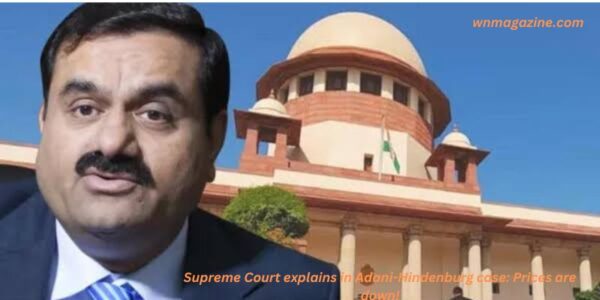Supreme Court explains in Adani-Hindenburg case: Prices are down!
2 min read
Supreme Court explains in Adani-Hindenburg case: Prices are down!
The central dispute between Adani-Hindenburg revolves around allegations of stock price manipulation by the Indian conglomerate Adani. The Supreme Court granted a three-month period for the Securities and Exchange Board of India (SEBI) to investigate two out of four cases, emphasizing that it cannot restrict SEBI’s investigative authority. The bench, including Chief Justice D. Y. Chandrachud, Justice B. Pardiwala, and Manoj Misra, also stated that there is currently insufficient evidence to prosecute Gautam Adani.
Also Read: wellhealth how to build muscle tag
Of the 24 cases SEBI handled related to allegations against the Adani group, 22 have been concluded. The Supreme Court ruled out the involvement of other investigative bodies, including a Special Investigation Team (SIT), as the existing facts do not warrant such intervention. Furthermore, the court directed the government and SEBI to examine the legality of Hindenburg’s market shorting and, if proven, take appropriate action against the company.
The Organized Crime and Corruption Reporting Project (OCCRP) report, considered unreliable, cannot serve as evidence. Chief Justice Chandrachud suggested that OCCRP would continue its research but without transferring the matter to another agency.
The Supreme Court’s caution against blindly trusting claims from both the Adani Group and the Hindenburg scandal was reiterated in its recent decision. This underscores the importance of transparent and honest investments. The court’s endorsement of SEBI’s decisions reinforces the strength and competence of regulatory bodies in managing complex financial issues.
The rejection of the request to involve a Special Investigations Team highlights the court’s emphasis on using such powers only in exceptional circumstances and the necessity for clear justifications. The court’s decision compelled the Indian government and SEBI to implement committee recommendations for investor protection following the Hindenburg incident.
SEBI Solicitor General Tushar Mehta reported that, out of 24 suspicious transactions, 22 had been thoroughly investigated, with the agency awaiting information from foreign authorities on the remaining two. Notably, a committee convened by the Supreme Court in May of the previous year approved the Adani Group, affirming the regulatory structure for investor protection in India.
Also read : wellhealthorganic home remedies tag
This landmark ruling not only reshapes the narrative surrounding the Adani Group but also clarifies the roles and powers of regulatory bodies in handling complex financial matters. It sets the stage for increased transparency and fairness in India’s banking sector.







